Top Rankings
Keene Independent School District ranks among the top 20% of public school district in Texas for:
Category
Attribute
Diversity
Most diverse schools (Top 1%)
For the 2025 school year, there is 1 public middle school serving 261 students in Keene Independent School District. This district's average middle testing ranking is 7/10, which is in the top 50% of public middle schools in Texas.
Public Middle School in Keene Independent School District have an average math proficiency score of 47% (versus the Texas public middle school average of 40%), and reading proficiency score of 56% (versus the 52% statewide average).
Minority enrollment is 63% of the student body (majority Hispanic), which is less than the Texas public middle school average of 75% (majority Hispanic).
Overview
This School District
This State (TX)
# Schools
4 Schools
2,747 Schools
# Students
1,097 Students
1,489,538 Students
# Teachers
96 Teachers
103,135 Teachers
Student : Teacher Ratio
11:1
11:1
District Rank
Keene Independent School District, which is ranked #492 of all 1,196 school districts in Texas (based off of combined math and reading proficiency testing data) for the 2021-2022 school year.
The school district's graduation rate of 90-94% has stayed relatively flat over five school years.
Overall District Rank
#484 out of 1204 school districts
(Top 50%)
(Top 50%)
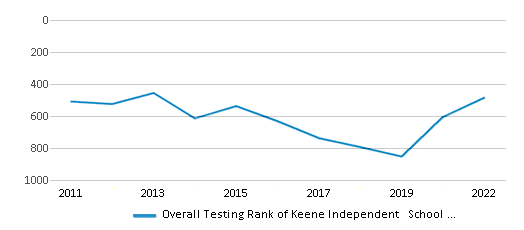
Math Test Scores (% Proficient)
42%
41%
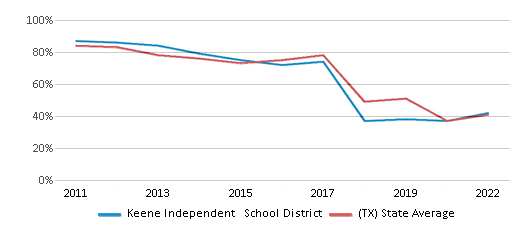
Reading/Language Arts Test Scores (% Proficient)
52%
51%
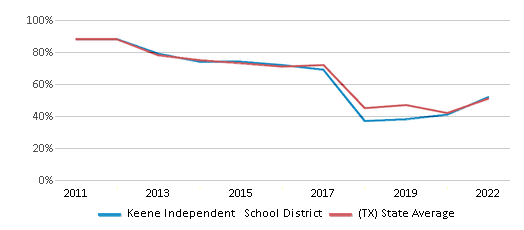
Science Test Scores (% Proficient)
46%
46%
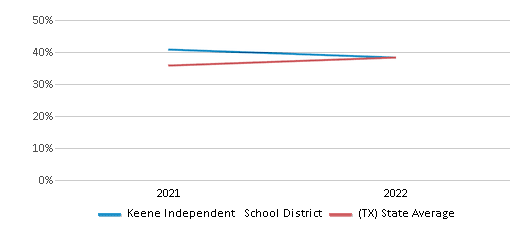
Graduation Rate
90-94%
90%
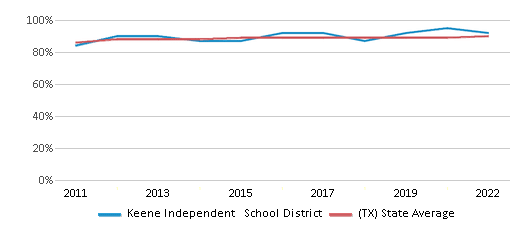
Students by Ethnicity:
Diversity Score
0.68
0.64
# American Indian Students
3 Students
5,199 Students
% American Indian Students
n/a
n/a
# Asian Students
6 Students
77,599 Students
% Asian Students
n/a
5%
# Hispanic Students
423 Students
795,444 Students
% Hispanic Students
39%
53%
# Black Students
31 Students
186,072 Students
% Black Students
3%
13%
# White Students
420 Students
378,957 Students
% White Students
38%
26%
# Hawaiian Students
171 Students
2,404 Students
% Hawaiian Students
16%
n/a
# Two or more races Students
43 Students
43,863 Students
% of Two or more races Students
4%
3%
Students by Grade:
# Students in PK Grade:
49
15,212
# Students in K Grade:
76
21,462
# Students in 1st Grade:
70
22,752
# Students in 2nd Grade:
64
22,958
# Students in 3rd Grade:
71
22,862
# Students in 4th Grade:
76
22,563
# Students in 5th Grade:
63
30,190
# Students in 6th Grade:
78
326,610
# Students in 7th Grade:
100
406,424
# Students in 8th Grade:
83
414,179
# Students in 9th Grade:
102
56,165
# Students in 10th Grade:
79
48,628
# Students in 11th Grade:
98
42,213
# Students in 12th Grade:
88
37,320
# Ungraded Students:
-
-
District Revenue and Spending
The revenue/student of $14,296 is higher than the state median of $13,387. The school district revenue/student has stayed relatively flat over four school years.
The school district's spending/student of $11,893 is less than the state median of $14,116. The school district spending/student has stayed relatively flat over four school years.
Total Revenue
$16 MM
$74,029 MM
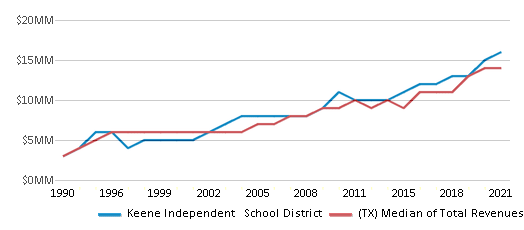
Spending
$13 MM
$78,063 MM
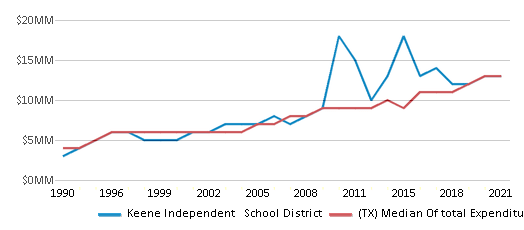
Revenue / Student
$14,296
$13,387
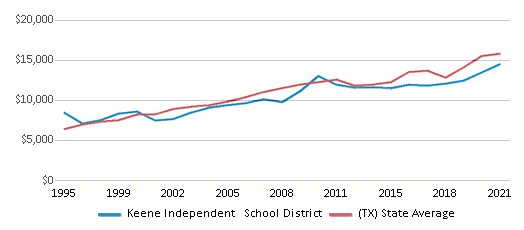
Spending / Student
$11,893
$14,116
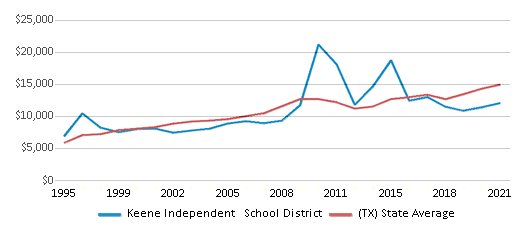
Best Keene Independent School District Public Middle Schools (2025)
School
(Math and Reading Proficiency)
(Math and Reading Proficiency)
Location
Grades
Students
Rank: #11.
Keene J High School
(Math: 47% | Reading: 56%)
Rank:
Rank:
7/
Top 50%10
401 Charger Dr
Keene, TX 76059
(817) 774-5311
Keene, TX 76059
(817) 774-5311
Grades: 6-8
| 261 students
Recent Articles

Sexual Harassment at Age 6: The Tale of a First Grade Suspension
A six-year old in Aurora, Colorado, was suspended after singing an LMFAO song to a little girl in his class and reportedly “shaking his booty.” We look at the case and the sexual harassment problem in public schools today.

How Scaffolding Could Change the Way Your Child Learns
This article explores the concept of instructional scaffolding, a teaching method that enhances learning by breaking down complex tasks into manageable parts. It highlights how scaffolding supports students in developing critical thinking skills and becoming more independent learners. The article discusses the benefits of scaffolding, including improved engagement and reduced anxiety, and provides strategies for its implementation across various educational levels.

February 05, 2025
Understanding the U.S. Department of Education: Structure, Impact, and EvolutionWe explore how the Department of Education shapes American education, from its cabinet-level leadership to its impact on millions of students, written for general audiences seeking clarity on this vital institution.





